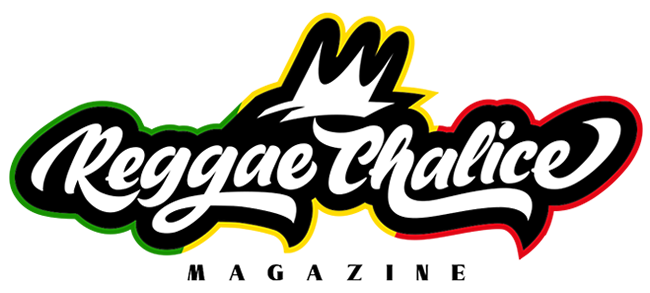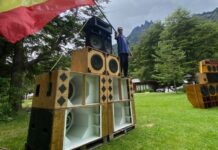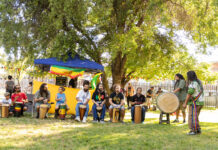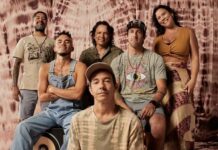“Never Stop Us” (never stop us), This is how the tour through Argentina and Chile that the Colombian singer carried out during June and July took by name Tarmac, musician whose eponymous band already has 17 years of life and five albums to his credit.
This tour brought him to Chile for the first time, although before he had a meeting with musicians from the national scene in the recording of the “Jahma Riddim”, make 9 years ago.
In the midst of your hectic schedule, Tarmac took the time to chat with Reggae Chalice about the tour, the reception of the public, the local and Latin American reggae scene, as well as the projects you are preparing.
Although his arrival in Chile from Argentina was a bit complicated, since it took longer than budgeted due to the snowfall that forced the closure of the Los Libertadores pass in mid-July, made a very positive balance of their presentations.
“Initially we had stipulated five dates here in Chile, but due to weather conditions the border route was closed, there was no step, so I had to stay in Mendoza for a few days where I made other presentations that we had not planned”, commented.
“There were four very busy dates, people heard them amazingly, the acceptation, the reception of the people was great. On two of those dates I was with Prior, Balaguero and Native of Roots, the artist friends here that I met in Colombia many years ago and with whom I had worked before”, he added.
Likewise, tarmac rated “the reunion with the family”, Y “It was very nice to be at the shows and sing for the first time in Chile and also that the foundation was laid, the seed was sown, many people knew about the proposal for the first time, a few already recognized it, they had her in their sights, but most of the crowd was new”.
The reggae scene in Latin America
The singer also highlighted the Chilean reggae scene and considered that many bands are regional benchmarks.
“Chile has always been an important reference for reggae in Spanish and artists like Tiano Bless, Original movement, Gondwana, Maxi Vargas that are important to mention, even Ganjah area who has residence in Chile. For Colombia, the Chilean scene is an important reference, We admire the musical processes that are here and it was important for me to come and visit this place.. It was the first tour, the beginning of many more to come”, assured.
How do you see the current reggae scene in Latin America??
—”Although the public acceptance of the events was good, yes I see that in general terms Latin America's reggae scene is in need of a revival, a strengthening, a solidification of all the incredible proposals that there are. there is a lot of talent, lots of bands on offer, of groups reggae artistic proposals that are well established, but I do consider that the scene requires a further impulse, more support from the people. I think the public should expand”
—“Each scene is very fragmented in its niche, each artist is working very independently, very individual and it is necessary on the one hand, the union and the articulation of the artists and groups and on the other hand, very important the support of the public in a massive way”
“There is not so much communication between the artists here”
in that line too He slipped a criticism for what he considers lack of support from the most consolidated groups to emerging artists.
“It caught my attention here in Chile that, despite the fact that the artists and groups that have a good disposition and have that capacity to receive new foreign proposals, as in my case, Well, all the artists I met welcomed me and received me very well., but I was surprised that internally here everyone is very alone, there is not so much communication between the artists here, the scene is almost completely closed, the groups that have already achieved an important position are not giving way to the new proposals”, he explained.
“Groups are closing a lot. Original movement, Ganjah area, Gondwana are examples of highly recognized groups globally and that are rarely seen working with new artists and new proposals of great projection.. I'm surprised we're not able to take music to that level, when reggae professes that unity, professes that love, ese ‘one love’ What does it mean to do reggae?, rasta culture is there hand in hand, so we are supposed to be little brothers and we should help each other to grow”, stressed the artist.
Projects
As for new jobs, The Colombian singer said that in the coming weeks he will have news.
“Right now that I return to Colombia I'm going to be releasing a new EP by 4 songs called ‘Burning Up‘, an EP that has all the connotations of burning fire, that has been one of the characteristics of the band”.
“Tarmac has always been characterized by using fire as an element of aesthetics and musicality., the band's lyrics have the element of fire (…) then they come 4 songs very lit around the fire in this EP”, he added.
Do you want to leave a message for reggae fans??
—”The message for all fans of reggae music, people who like content music, music with a conscious message is that they fight for their freedom, do not stop stealing that so precious (…) stand firmly on the rights and always with the truth”.
—”He who works with the truth is not afraid of the consequences and there is strength in unity, So the message is not only for Chile but for the whole world.: unity of peoples in pursuit of maintaining and recovering freedom. Stand your ground like you said Bob Marley: ‘Get up and stand up for your rights'”.





















